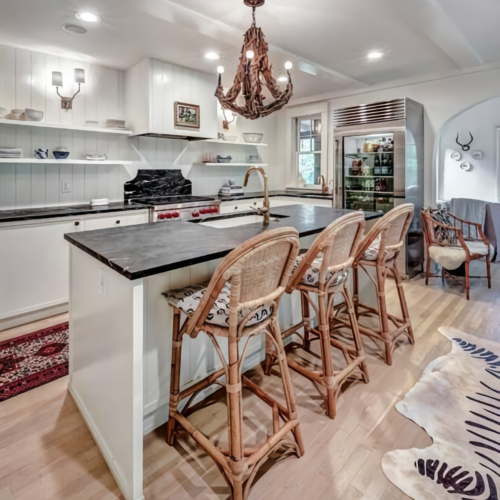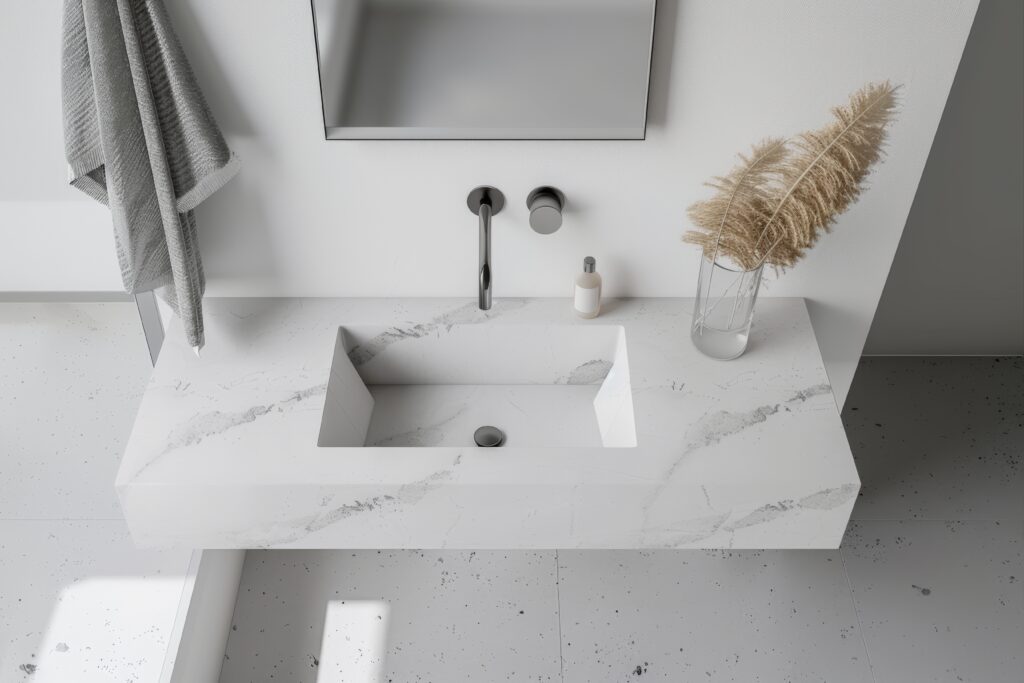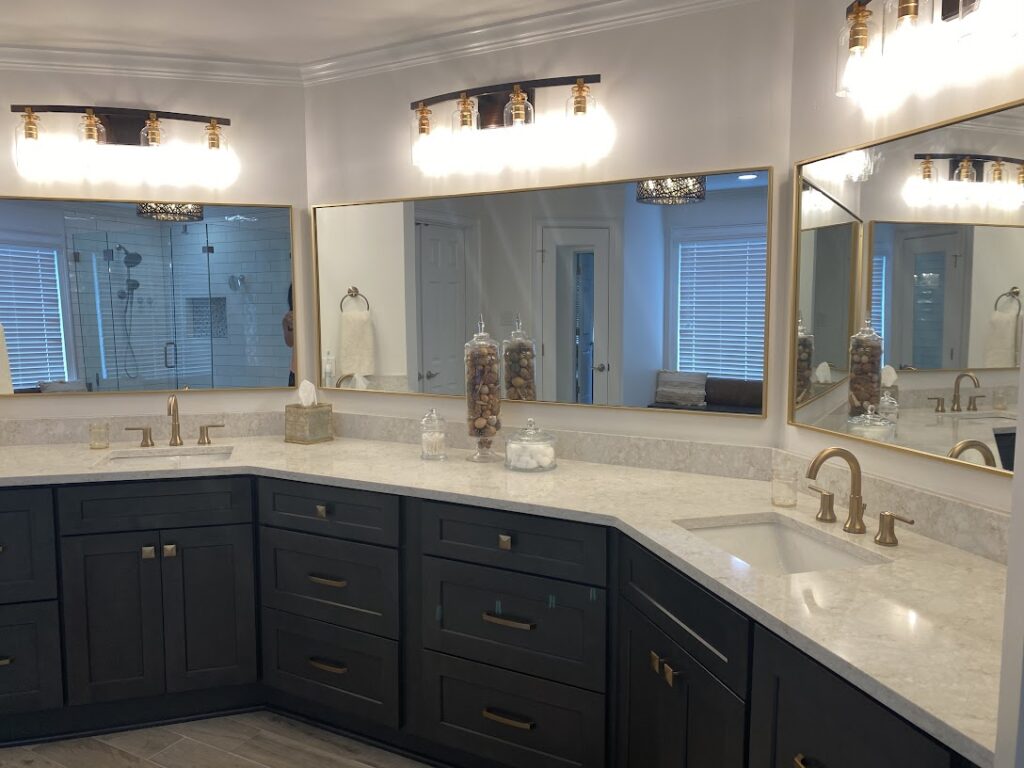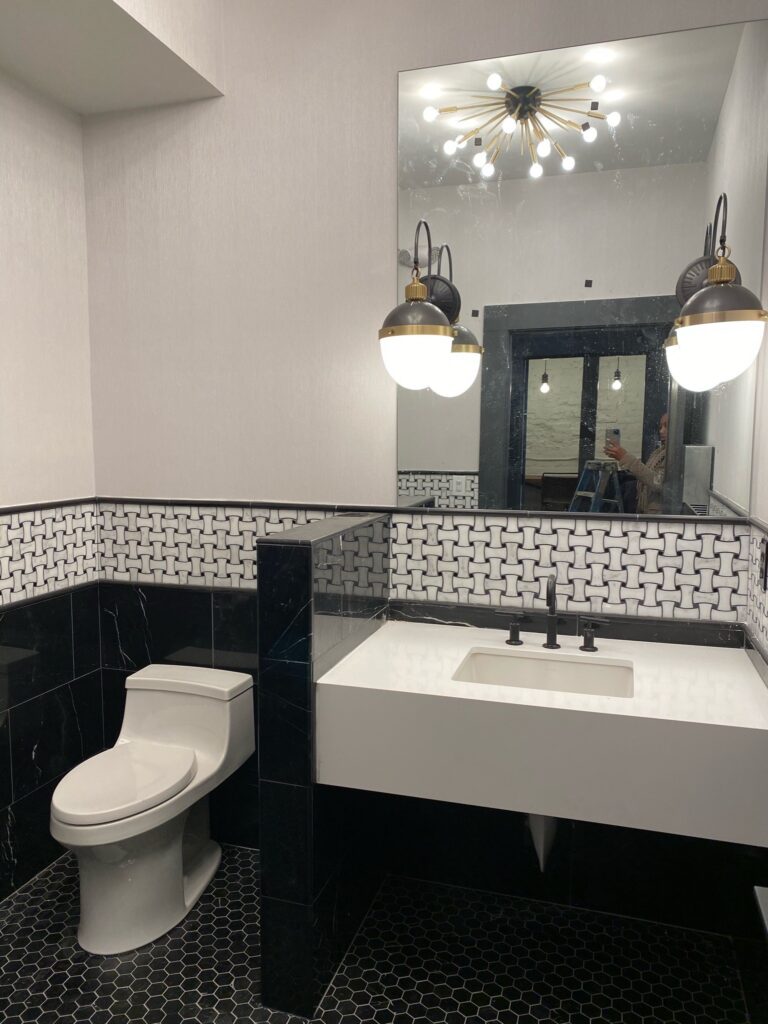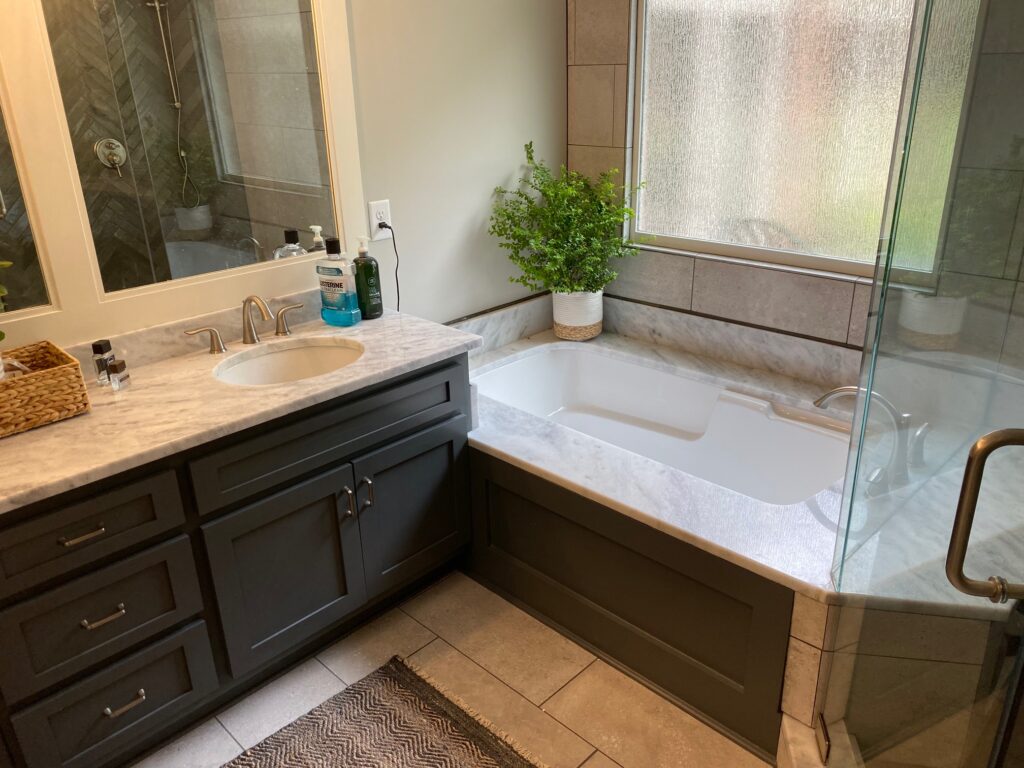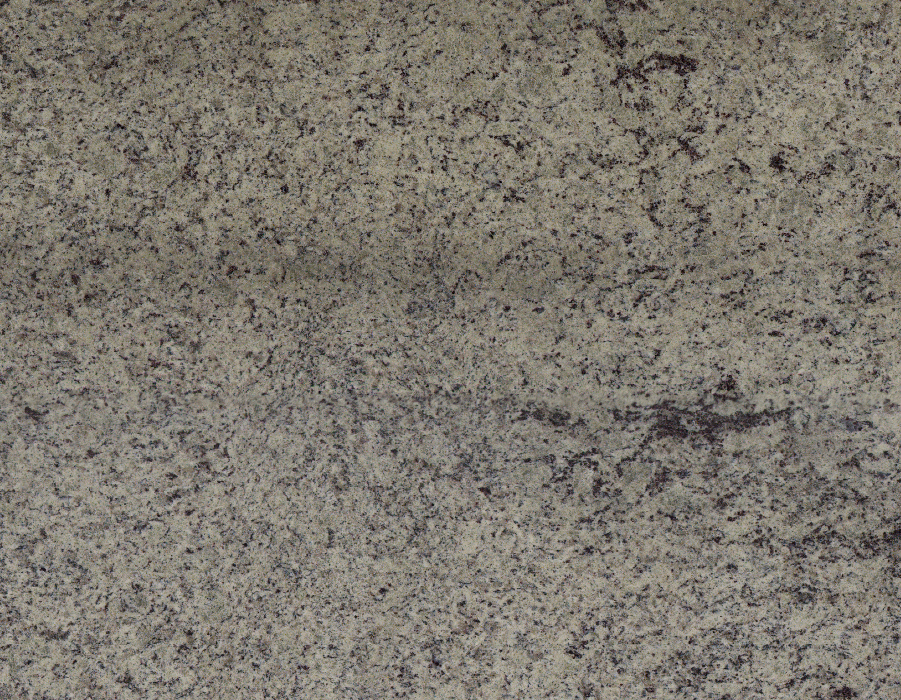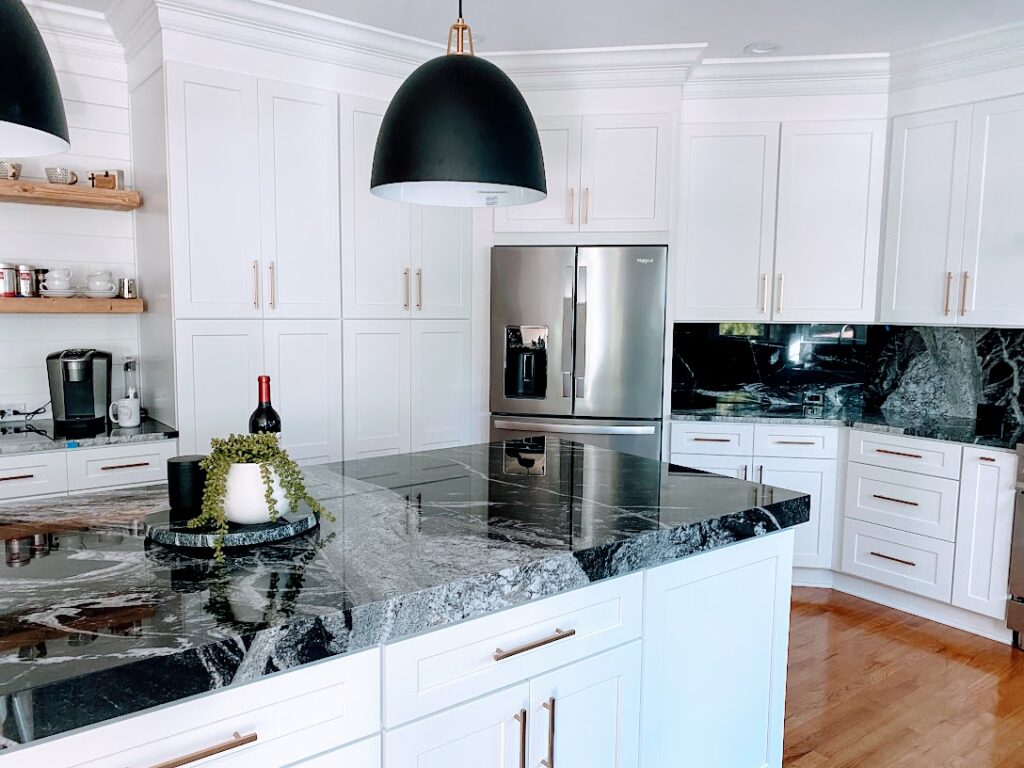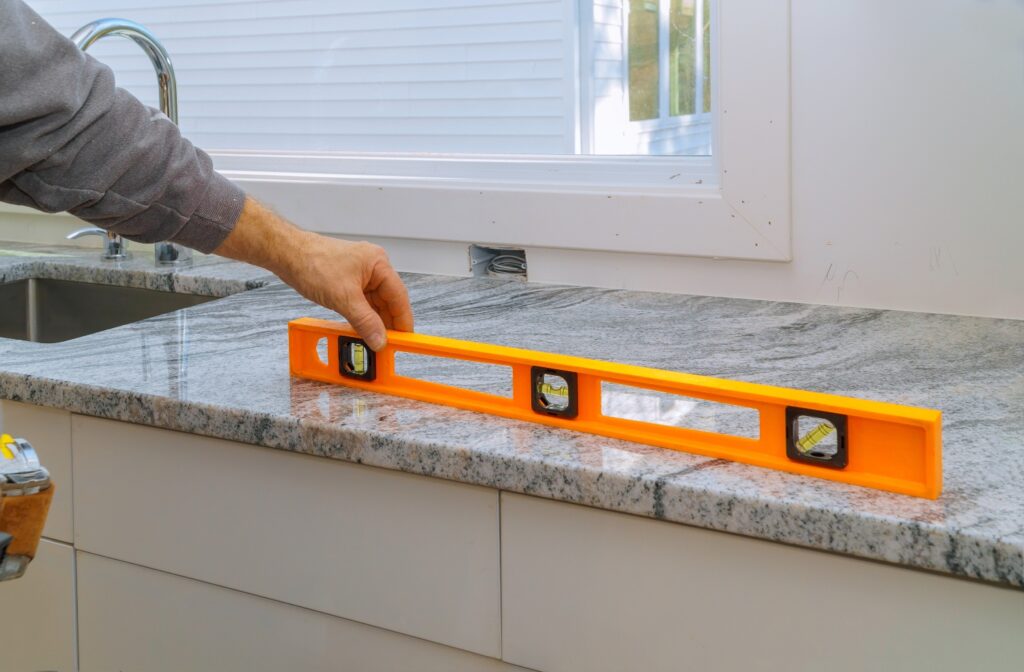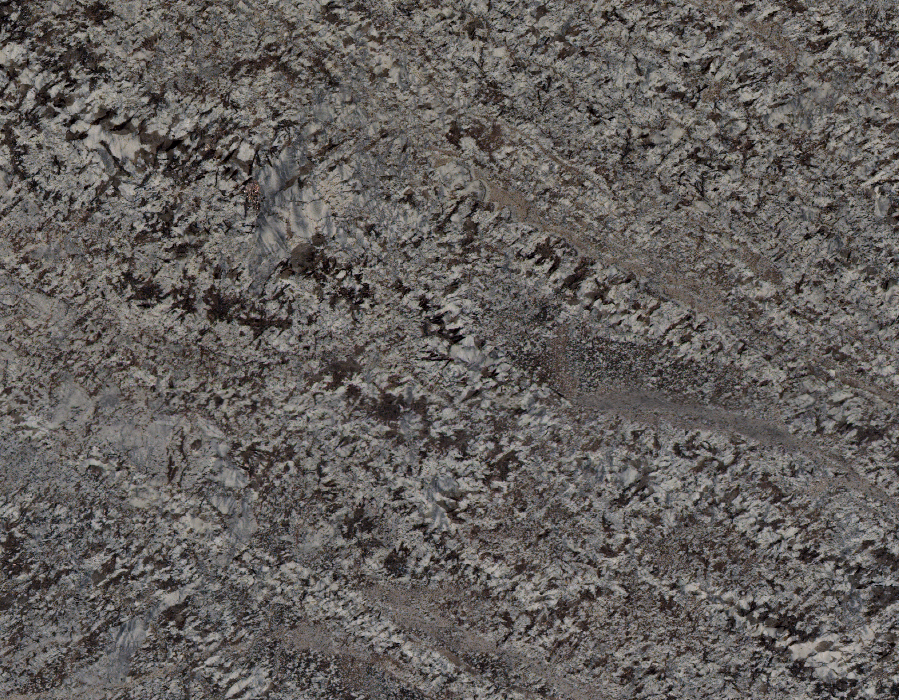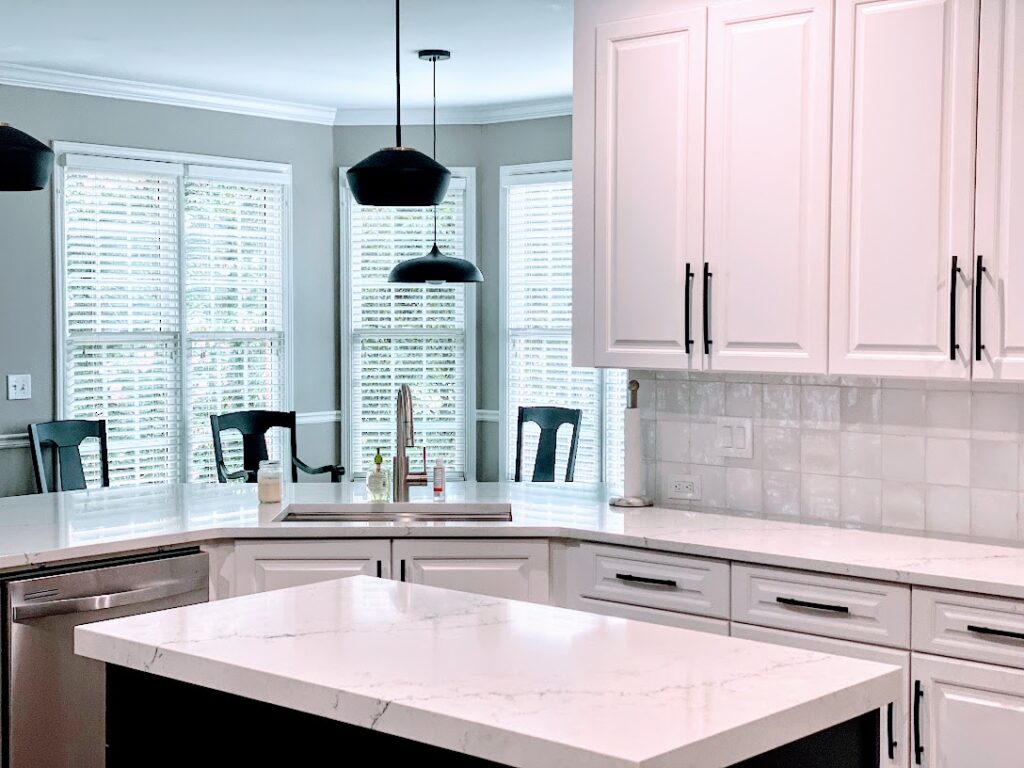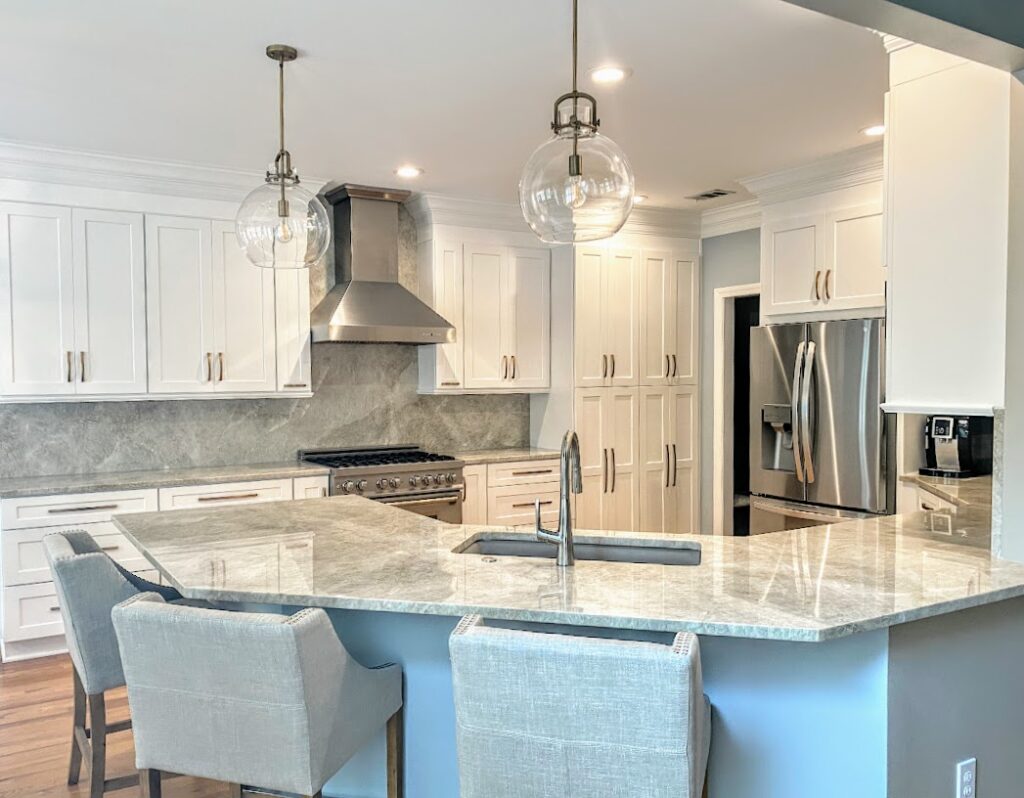Quartz Countertops vs. Soapstone Countertops
When you’re considering a new countertop for your kitchen, quartz and soapstone, each offer unique benefits that might align with your needs. Quartz countertops, with their engineered precision, provide a modern, sleek finish that resists stains and scratches, requiring minimal upkeep. On the other hand, soapstone brings a rustic charm with its distinct veining and a surface that ages gracefully, though it does need regular oiling. The decision isn’t just about looks—how you want your kitchen to function and feel over time. But which material truly aligns with your lifestyle and aesthetic?
Material Composition
Regarding material composition, quartz, and soapstone countertops are quite distinct. If you’re considering quartz, you’re looking at a man-made material. Quartz countertops are engineered from about 90-95% natural quartz crystals mixed with 5-10% resins, polymers, and pigments. This creates a non-porous surface that’s remarkably durable and resistant to stains, scratches, and impacts.
The manufacturing process allows for various color and pattern options, closely mimicking natural stone or offering unique designs.
In contrast, soapstone is a natural metamorphic rock composed primarily of talc, chlorite, pyroxene, and mica. It’s a softer material with a talc content that gives it a smooth, almost soapy feel, hence the name—this mineral composition results in a surface more prone to scratches and nicks than quartz.
However, soapstone is non-porous and naturally resistant to bacteria and stains, making it a hygienic choice for kitchens. Like many other natural stones, soapstone doesn’t require sealing. Its natural density and oil-rich composition naturally darkens over time, developing a unique patina.
On the other hand, quartz’s engineered nature means it maintains its appearance without needing much maintenance aside from regular cleaning.
Choosing between quartz and soapstone depends largely on your priorities. If you value durability and low maintenance, quartz might be your ideal choice. However, if you’re drawn to the natural, evolving character of a stone that ages gracefully, soapstone could be your countertop.
Aesthetic Differences
Visual appeal often plays a crucial role when choosing a countertop, and quartz and soapstone offer distinct aesthetics that cater to different tastes.
If you prefer a sleek, modern look, quartz might catch your eye. It comes in many colors and patterns, often mimicking natural stone like marble or granite. This versatility lets you match quartz countertops with almost any kitchen or bathroom décor. The uniformity in quartz patterns provides a clean, consistent appearance, perfect for those who love a polished and contemporary vibe.
On the other hand, if you’re drawn to a more classic or rustic style, soapstone could be your ideal choice. With its soft, matte finish and natural veining, soapstone offers a unique, earthy aesthetic. It typically comes in shades of gray, green, or black, developing a patina that enhances its charm over time.
The subtle variations and natural imperfections in soapstone give it a warm, inviting feel, making it a standout choice for those who appreciate character and history in their home design.
When deciding between quartz and soapstone, think about the overall look you want to achieve. Quartz provides a refined, consistent appearance that’s easy to coordinate with other elements in your space.
Soapstone, meanwhile, offers a natural, organic look with unique veining and color that changes beautifully with age. Both options can elevate the aesthetic of your home, but your choice ultimately depends on whether you lean towards modern elegance or timeless warmth.
Durability and Maintenance
While aesthetics certainly matter, the practicality of your countertop choice can’t be overlooked. When it comes to durability, quartz and soapstone, each have their strengths.
Quartz countertops are incredibly durable, being resistant to scratches, stains, and chipping. This makes them an excellent choice if you’re looking for a low-maintenance option that can withstand the hustle and bustle of a busy kitchen.
On the other hand, soapstone is known for its unique ability to resist heat and chemicals. You can place a hot pan directly on it without damaging the surface. However, soapstone is softer than quartz, so it can scratch more easily. The good news is that any scratches can usually be sanded out, and some homeowners even appreciate the patina that develops over time, giving it a more rustic charm.
Maintenance is another crucial factor. Quartz is non-porous, making it resistant to bacteria and a breeze to clean. A simple wipe-down with soap and water is often all you need to keep it looking pristine.
Unlike quartz, soapstone requires periodic oiling to maintain its color and luster. This isn’t a huge task, but it means a bit more regular upkeep than quartz.
Both materials can last for decades if properly cared for. Your choice ultimately depends on whether you prefer the hassle-free maintenance of quartz or don’t mind the occasional upkeep of soapstone for its distinct appearance and heat resistance.
Cost Comparison
You’ll quickly notice some key differences in the cost comparison between quartz and soapstone countertops. This price can fluctuate based on your chosen brand, color, and pattern. Quartz is engineered, and its consistent appearance offers many options, sometimes leading to higher prices for premium styles and colors.
Soapstone tends to be more consistent in pricing, primarily because it’s a natural stone with fewer appearance variations than quartz. However, the cost can still vary depending on the thickness and the slab quality you select.
When considering the overall budget for your kitchen or bathroom project, factoring in these price ranges is crucial. Quartz is sometimes more affordable, especially if you opt for a standard design. However, the cost can quickly increase if you prefer unique or high-end options.
Conversely, soapstone generally remains within a narrower price range, making budgeting a bit more straightforward.
Another aspect to consider is the installation cost. Due to their weight and complexity, both materials require professional installation, which can substantially add to your total expense. Remember that local labor rates and the intricacy of your chosen design can affect the final installation cost.
Ultimately, your choice might depend on your budget, design preferences, and the specific look you aim to achieve in your space.
Environmental Impact
Evaluating the materials’ sourcing and production processes is essential when considering the environmental impact of quartz and soapstone countertops.
Quartz countertops are engineered using a mix of natural quartz and resins. The extraction of quartz involves mining operations, which can disrupt ecosystems and lead to habitat destruction. Additionally, the production process requires energy-intensive machinery, contributing to greenhouse gas emissions. The resins used may contain petrochemicals, adding another layer of environmental concern.
On the other hand, soapstone is a natural stone that doesn’t require chemical additives or extensive processing. Mined in smaller quantities, its extraction generally has a lower environmental footprint than quartz. However, the environmental impact varies depending on the mining practices in a specific region. Some mines adhere to strict environmental regulations, while others might not, affecting the overall sustainability of the material.
Transportation also plays a crucial role in environmental impact. Quartz is often imported and transported over long distances, increasing its carbon footprint. Soapstone, being available from local quarries in some regions, can reduce transportation emissions if sourced nearby.
When choosing between the two, you should also consider the longevity and recyclability of the materials. Soapstone is durable and can last for decades, potentially reducing the need for replacement and waste. Quartz can also be long-lasting, but its recyclability is more complex due to the resin content.
Ultimately, your choice should align with your environmental priorities, considering sourcing, production, and transportation factors. Understanding these aspects allows you to make a more sustainable decision for your kitchen or bathroom.
Installation Considerations
Installing quartz or soapstone countertops requires careful planning and consideration of your needs and kitchen layout. First, assess the available space and your kitchen’s overall design. Both materials have unique attributes that might affect the installation process.
Quartz, being engineered, allows for consistency in color and pattern, making it easier to match with existing kitchen elements. Soapstone, a natural stone, offers a unique appearance with varying veining, requiring more consideration to ensure it complements your kitchen’s aesthetic.
When you’re preparing for installation, think about the weight of the materials. Quartz is heavier and might need additional structural support, especially for larger slabs. Ensuring your cabinets and floors can handle this extra weight is crucial.
While generally lighter, soapstone still requires you to verify adequate support, particularly if you’re planning for thicker slabs.
Professional installation is highly recommended for both quartz and soapstone. Their weight and the precision needed for cutting and fitting make DIY installations risky and potentially costly if errors occur. Professionals can ensure that seams are minimized and that the countertops fit perfectly with your existing kitchen fixtures.
Consider the edges and finishes you prefer. Quartz offers a variety of edge profiles and finishes, which can be customized to suit your taste.
Soapstone, on the other hand, typically features a more rustic, matte finish. Decide on these details ahead of time to streamline the installation process.
Frequently Asked Questions
Are Quartz Countertops More Heat Resistant Than Soapstone Countertops?
When considering heat resistance, soapstone handles heat better than quartz. Soapstone doesn’t scorch or crack under high temperatures, while quartz can be damaged by hot pots. Always use trivets on quartz surfaces.
Can Quartz Countertops Be Customized With Integrated Sinks?
Yes, you can customize quartz countertops with integrated sinks. This option offers a seamless look, minimizes joints, and simplifies maintenance. When planning your design, consult with a professional to ensure it meets your specific needs and preferences.
Do Soapstone Countertops Require Special Cleaning Products?
You don’t need special cleaning products for soapstone countertops. Just use mild dish soap and warm water. Avoid harsh chemicals or abrasives that might damage the surface. Regularly applying mineral oil can enhance and maintain its natural beauty.
How Does the Resale Value Differ Between Quartz and Soapstone Countertops?
When considering resale value, you should know quartz countertops generally boost property value more due to their durability and popularity. Soapstone offers a unique aesthetic appeal, but it might not increase value as significantly as quartz.
Are Quartz Countertops More Prone to Staining From Food and Beverages?
If you’re not careful, quartz countertops might be more prone to staining. Their resin can absorb liquids like wine or coffee, so wipe spills quickly. Regular sealing isn’t required, but taking precautions ensures your countertop stays pristine.
Conclusion
When deciding between quartz and soapstone countertops, think about your priorities. Quartz offers a sleek, modern look with low maintenance, perfect if you prefer hassle-free durability. On the other hand, soapstone brings a rustic charm that ages beautifully but needs regular care. Consider your lifestyle and maintenance willingness. Both have unique qualities, so your choice should reflect your style and how much upkeep you’re ready to commit to for your kitchen’s centerpiece.

Val Carvalho is a manager at Atlanta Stone Creations, with nearly two decades of experience in the stone and design industry. In addition to her leadership role, Val plays a key part in sales and design, bringing creativity, precision, and a strong sense of style to every project. Known for her warm and collaborative approach, she builds strong relationships with both her team and her clients. Val is passionate about delivering beautiful, high-quality results and creating an exceptional experience from start to finish.

